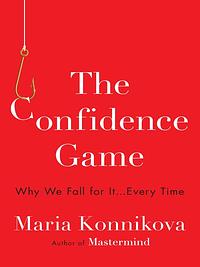Take a photo of a barcode or cover
While very well written, it was just too depressing to read about all these soulless con people…especially with the current trump administration wrecking democracy.
Not as interesting as The Biggest Bluff
I enjoyed the author's The Biggest Bluff book better then this maybe because the author actually lived that. This one felt like a research presentation - factually correct but lacking the emotion from the other book. Great book to read by itself but after reading the other one, I couldn't help comparing.
I enjoyed the author's The Biggest Bluff book better then this maybe because the author actually lived that. This one felt like a research presentation - factually correct but lacking the emotion from the other book. Great book to read by itself but after reading the other one, I couldn't help comparing.
challenging
dark
funny
informative
reflective
sad
medium-paced
i loved this book because i'm fascinated by con artists and social engineering, but i am also a wimp and some of the stories made me profoundly sad for the people who had been conned (sometimes 200 years ago) so i needed to take breaks. it's so informative and well researched and definitely worth a read!
Um livro bem leve (e um tanto leviano) sobre poder de convencimento e como isso é explorado. A Konnikova passa por vários tipos de trambique e como as pessoas elaboram e aplicam ele, explicando que tipo de viés cognitivo está envolvido em aceitar aquela história. Ela faz um trabalho muito bom de mostrar que estamos todos sujeitos e muito do trambique é só a forma como pensamos e nos comunicamos levada ao extremo. Os exemplos são bem legais e a análise bem leve e tranquila de seguir. Recomendo para quem quiser entender como pensamos e aproveitar exemplos aplicados.
reflective
medium-paced
slow-paced
informative
slow-paced
Tapping out after 70 pages. Any insights Konnikova might have are buried in a flood of pop psychology and endless repetition based upon broad concepts. For example, Konnikova argues that “mere exposure” and repetition leads to positive familiarity. But if that were true, no ad campaign could possibly fail. If I say to you, “1-877-Karz-4-Kidz” does it make you happy or does it make you want to firebomb my house?
When you couple the weak writing with Konnikova being a protégé of the notorious Steven Pinkner and the link she puts in her notes section not leading to any actual notes (perhaps it did at the time of publication, but now it’s just praise for the book), I feel like to keep pushing ahead would be a waste of time. I have other books to read.
When you couple the weak writing with Konnikova being a protégé of the notorious Steven Pinkner and the link she puts in her notes section not leading to any actual notes (perhaps it did at the time of publication, but now it’s just praise for the book), I feel like to keep pushing ahead would be a waste of time. I have other books to read.
Should be a hit with people who have a passing interest in cons and psychology, but I was hoping for something a little more focused. The writing constantly switches back and forth from super dense and breezily anecdotal, which tired me out a lot by the halfway point. 2.5/5 or so
Good book. Definitely some stuff I had run across elsewhere, but nicely structured and focused. In particular I appreciated the breakdown step by step of the different parts of the con--which parts they hit, emotionally, and which flaws they then exploit. Everyone at some point makes a perfect mark--and if you think otherwise, then you're probably on a list somewhere as an easy sucker whose already been hit multiple times (because who wouldn't love a mark who thinks they can't be wrong?).
A final thought: everyone on this list either got caught or at least had the someone realize something wasn't on the up and up. They made stupid mistakes--how many don't?
A final thought: everyone on this list either got caught or at least had the someone realize something wasn't on the up and up. They made stupid mistakes--how many don't?




